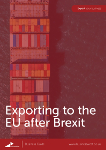
When MPs first got to debate how Brexit would be implemented the most significant flashpoint was an amendment from Labour backbencher Chuka Umunna to keep the UK inside the single market. But what does this mean, and why is it so important to business?
The single market, which developed from the common market we joined in 1973 and was largely driven by British Conservatives, began as a way of making it easier for businesses to trade right across our continent without any barriers. So when West Country dairy companies export their cheese to France it does not have to be checked to make sure it reaches health and safety standards and there is no paperwork when it crosses the border.
This obviously implies that we all have to meet the same standards of products, which is why British manufacturers have to follow European law, as do manufacturers in Hungary and Greece. The standards are set through a democratic process, of which I am a small part as your representative in the European Parliament. So if the French cheese-makers try to change a regulation in a way that gives their producers an unfair advantage, I have to spot that and block it. And the same if German car-makers try to lobby for engine tests that would give their vehicles an advantage.
As the single market has developed European economies have become more and more integrated. The EU has become a single manufacturing base and companies like Honda in Swindon or Airbus in Bristol have adjusted so that the components they use may travel backwards and forwards across the EU before the product is finalised. Because there are no border checks they can also rely on instant delivery and just-in-time production methods which increase efficiency and reduce costs.
Although the single market began as an economic initiative, over time it has also been used to increase environmental and social standards of production. For example, it is the EU’s rules that domestic appliances have to reach higher standards of energy efficiency that means we are using less energy and facing lower energy bills. And it is the European ban on neonicotinoid pesticides that means our bees are protected from these chemicals that have caused their numbers to dwindle. And because British people care about high welfare standards for animals on farms we have managed to have battery cages for hens eliminated right across the EU market of half a billion people.
So the single market is essential to the success of British business but also protects the high standards of living we enjoy as European citizens. Like so many Brexit issues, both Labour and Conservative parties are divided on the single market which means, if we are to have the arrangements that our public services and businesses need after Brexit, we are going to need our politicians to work across parties for the good of the country.
- Log in to post comments

